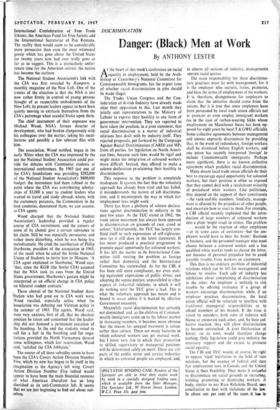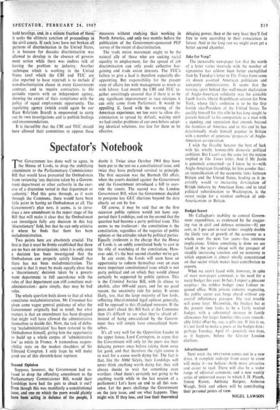Danger: (Black) Men at Work
DISCRIMINATION
By ANTHONY LESTER
AA T the heart of this week's conference on racial equality in employment, held by the Arch-
bishop of Canterbury's National Committee for Commonwealth immigrants, lies the urgent issue of whether -racial discrimination in jobs should be made illegal.
The Trades Union Congress and the Con- federation of British Industry have already made clear their opposition to this. Last month they jointly sent representatives to the Ministry of Labour to express their hostility to any form of government intervention. They are reported to have taken the position, in a joint statement, that racial discrimination is a matter of industrial relations best dealt with by industry itself. They rejected proposals, put forward by the Campaign Against Racial Discrimination (CARD) and MPs from all parties, for legislation on North Ameri- can lines, because such laws would be rigid and might make the integration of coloured workers more difficult. Instead, they offered to make a solemn declaration proclaiming their hostility to discrimination.
This response to the problem is completely inadequate. It ignores the fact that the voluntary approach has already been tried and has failed; it misunderstands the nature of job discrimina- tion; and it misinterprets the way in which fair employment laws might work.
There has been a plethora of 'solemn declara- tions against discrimination in industry in the past few years As the TUC stated in 1962, 'the trade union movement has always been opposed to discrimination on grounds of race, creed or colour.' Unfortunately, the TUC has largely con- fined itself to such expressions of self-righteous- ness (as it still does in the latest statement). It has never produced a practical programme to promote equal opportunity for coloured workers. It has left the matter to its International Com- mittee (still treating the problem as foreign rather than domestic), and the International Committee has stonewalled. As for the CBI, it has been still more complacent, not even mak- ing equivalent expressions of public virtue, and adopting the supine posture, unparalleled in other aspects of industrial relations, in which it will do nothing until the TUC gives a lead. This is what the voluntary approach has meant and is bound to mean unless it is backed by effective Government measures.
Meanwhile racial discrimination has certainly not diminished, and, as the children of Common- wealth immigrants come on to the labour market in increasing numbers, it becomes more obvious that the reason for unequal treatment is colour rather than culture. There are many factories in which coloured workers can get manual work, but I know very few in which their promotion to skilled, supervisory or managerial positions will be determined solely on merit. There are still parts of the public sector and service industries in which no coloured people are employed, and, in almost all sections of industry, managements operate racial quotas.
The main responsibility for these discrimina- tory practices must lie with management, for it is the employer who recruits, trains, promotes, and fixes the terms of employment of his workers. It is, therefore, disingenuous for employers to claim that the initiative should come from the unions. But it is true that some employers have been persuaded by local trade union officials not to promote or even employ immigrant workers (as in the case of turban-wearing Sikhs whose employment on Manchester buses has been op- posed for eight years by local T & GWU officials). Some collective agreements between management and unions expressly discriminate by providing that, in the event of redundancy, foreign workers shall be dismissed before English workers, and one union has recently interpreted 'foreign' to include Commonwealth itmnigrants. Perhaps more significant, there is no known collective agreement which prohibits racial discrimination.
Many decent local trade union officials do their best to encourage equal opportunity for coloured workers, but their position is often so exposed that they cannot deal with a recalcitrant minority of prejudiced white workers. Like politicians, they depend on the support of their constituents —the rank-and-file members. Similarly, manage- ment is affected by the prejudices of other people, and uncertain how to react to them. For example, a CBI official recently explained that the intro- duction of large numbers of coloured workers into a plant 'might result in strikes. The problem . . . would be the reaction of other employees —or in some cases of customers—but the em- ployers would have to bear the brunt.' Business is business, and the personnel manager who must choose between a coloured worker and a less qualified white worker tends to choose the latter, not because of personal prejudice but to avoid possible trouble from workers or customers.
This then is no ordinary problem of industrial relations which can be left for management and labour to resolve. Each side of industry has inhibitions about complaining of discrimination to the other. An employer is unlikely to risk trouble by offering resistance if a group of workers encourage discrimination, while, if an employer practises discrimination, the local union official will be reluctant to interfere with traditional managerial responsibilities or to offend members of his branch. If the issue is raised by outsiders, both sides of industry will blame or exonerate each other, and, by their col- lective inaction, they will allow discrimination to become entrenched. A joint Declaration of Intent, on its own, would therefore change nothing. Only legislation could give industry the necessary support and the excuse to promote racial equality.
The CBI and TUC would, of course, be right to oppose 'rigid' legislation in the field of race relations, but the essence of federal and state fair employment laws in Canada and the United States is their flexibility. They make it unlawful to discriminate on racial grounds in recruiting, training, promoting or dismissing workers. A body, similar to our Race Relations Board, uses conciliation to deal with violations of the hum In about one per cent of the cases it has to hold hearings, and, in a minute fraction of these, it seeks the ultimate sanction of proceedings in the civil courts. If such laws have not broken all patterns of discrimination in the United States, it is because for decades discrimination was allowed to develop in the absence of govern- ment action while there was endless talk of leaving the problem to industry. Another technique which is working in the United States (and which the CBI and TUC are also reported to have rejected) is to include 0 non-discrimination clause in every Government contract, and to require contractors to file periodic reports with an independent agency, showing the extent of their compliance with the policy of equal employment opportunity. The, regulating agency (which could again be our Race Relations Board) is empowered to carry out its own investigations and to publish findings and recommendations.
It is incredible that the CBI and TUC should have allowed their committees to oppose these measures without studying their working in North America, and only two months before the publication of the Government-sponsored PEP survey of the extent of discrimination.
The trade union movement ought to be the natural ally of those who are seeking racial equality in employment, for the spread of job discrimination can only erode collective bar- gaining and trade union interests. The TUC's failure to give a lead is therefore especially dis- appointing. But responsibility for the present state of affairs lies with management as much as with labour. Last month the CBI and TUC to- gether unwittingly ensured that if there is to be any significant improvement in race relations it can only come from Parliament. It would be appalling if, faced with the warning of the American experience, we too were to allow dis- crimination to spread by default, waiting until we had similar problems of our own before adopt- ing identical solutions, too late for them to be effective.































 Previous page
Previous page